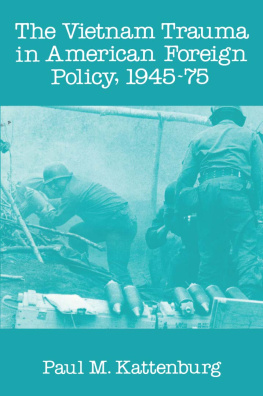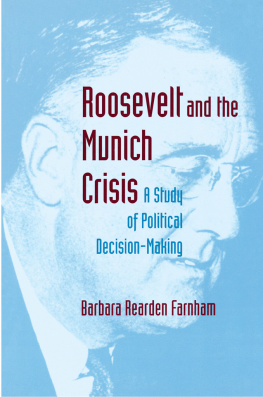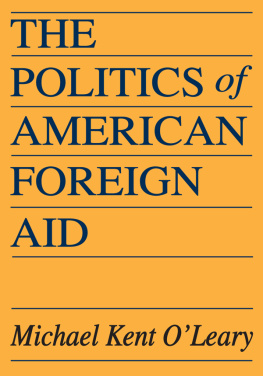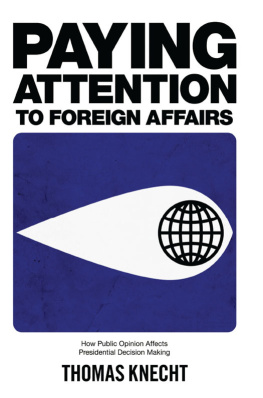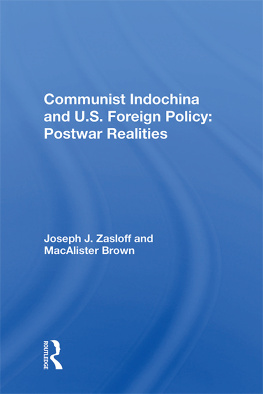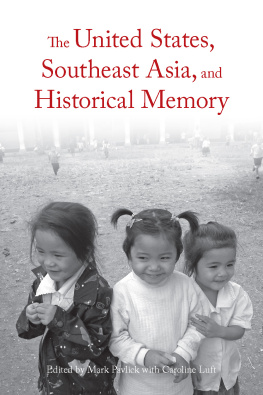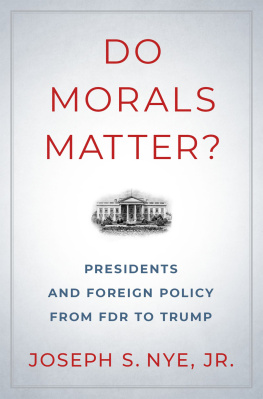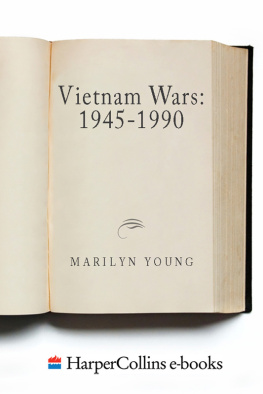First published 1980 by Transaction Publishers
Published 2018 by Routledge
2 Park Square, Milton Park, Abingdon, Oxon 0X14 4RN
52 Vanderbilt Avenue, New York, NY 10017
Routledge is an imprint of the Taylor & Francis Group, an informa business
Copyright 1980 by Taylor & Francis.
All rights reserved. No part of this book may be reprinted or reproduced or utilised in any form or by any electronic, mechanical, or other means, now known or hereafter invented, including photocopying and recording, or in any information storage or retrieval system, without permission in writing from the publishers.
Notice:
Product or corporate names may be trademarks or registered trademarks, and are used only for identification and explanation without intent to infringe.
Library of Congress Catalog Number: 79-66437
Library of Congress Cataloging in Publication Data
Kattenburg, Paul M.
The Vietnam trauma in American foreign policy, 1945-75.
Includes bibliographical references and index.
1. United StatesForeign relationsVietnam. 2. VietnamForeign relationsUnited States. 3. Vietnamese Conflict, 1961-1975United States. I. Title.
E183.8.V5K36327.730597
79-66437
ISBN 13: 978-0-87855-903-9 (pbk)
Time has not healed the wounds of Earl and Maegene Pittman in Beallsville, Ohio. They lost their only son, Jack, 30, in the war. He was one of seven young men from the southern Ohio hamlet, all graduates of the same high school, who died in Vietnam. It was a high price for a town of little more than 400 people to pay. Mrs. Pittman, 55, is still bitter. Thats one thing you never forget about, she says. Hes on our minds all the time. Vietnam wasnt worth anybodys life. What did they gain by it? The way I feel about it, my boy gave his life for nothing.
Ed Mechenbier, 35, was a prisoner of war for nearly six years who returned to civilian life near Springfield, Ohio. He says perhaps the war should be forgotten. I dont know that its touched anyone good. I just cant see benefits, real or imagined, out of the whole affair. Personally, its just a great big void for me now. I just look at the years I personally spent there as a void. They just have no meaning. I would really say wasted.
From Haunting MemoriesThree Years Ago, Vietnam Guns Fell Silent by Associated Press writer George Esper, published in The State, Columbia, S.C., Sunday, April 30, 1978, p. 10-B.
As this is written, more than four years have passed since the final debacle of April 1975, in Indochina; more than six years have passed since the last American soldiers, the POWs, came home. For a while, we wanted to forget. Invitations to lecture on the war, to explain how and why we got into it and what it meant, which had been frequent in the early seventies for those of us who claimed some expertise on the subject, tapered off after 1975. Student interest in my classes seemed to wane. Adults fell into a sort of collective amnesia. Almost anyone interested had read David Halberstams masterful The Best And The Brightest, which had appeared in paper in 1973, and everything seemed to have been said. We silently nursed the wounds of war, aggravated by those of Watergate. An entire generation of students went through college between 1975 and 1979 largely ignorant of our Vietnam experience.
At present, there is a revival of interest. The subject is no longer taboo. Gen. William Westmoreland, who some years ago suggested in a Firing Line interview with William Buckley that the subject best be left for distant future historians to examine in its entirety once all the records had been opened and all the passions had died out, has been waging a one-man campaign to rehabilitate the war, or at least Americas engagement in it. He recently told the editors of a new military history of the war, to be published in London and for which he is writing a preface, that here at last was a book of which the children and grandchildren of Vietnam veterans could be proud because it essentially showed that instead of having lost, we had won (New York Times, April 22, 1979, p. 59). Westmoreland was first among the principals to break a sort of tacit gentlemens agreement between them that they would not scar each other through the post-war publication of recriminations. Adm. Ulysses Grant Sharp, Pacific Theater Commander during the war, has also recently published on the subject; and the publication of Henry Kissingers memoirs is imminent.
In the past two years, important new works by non-participants have been published, such as Gallucis Neither Peace Nor Honor; Lewys America in Vietnam and Ravenals Never Again. Two significant works, Shawcrosss Sideshow and Gelb and Betts The Irony of Vietnam: The System Worked, appeared after my own manuscript had been substantially completed. These books complement such important earlier works as Halberstams, Fitzgeralds Fire in the Lake, Barnets Roots of War, Ellsbergs Papers on the War and Gloria Emmersons Winners and Losers. A splendid war story, Dispatches by Michael Herr, vividly brought home to those who read it the horror and futility of Vietnam from the standpoint of the GI. A spate of Vietnam-related movies are now showing, of which Coming Home, The Deer Hunter, Friendly Fire and Apocalypse Now are only an early sampling. A major series on the history of the war is being prepared for the Public Broadcasting System. The Congressional Research Service is preparing a detailed historical analysis of Congresss role in U.S. Indochina policy. One gathers that a new and far more detailed documentary history of the war than the Pentagon Papers of the early seventies is being readied by specialists in the Pentagon and related think tanks.
The reflowering of interest in the war and its meaning responds to a real need, which is why I have no hesitation in offering still another new book. Recurring and searching questions, especially by the young, deserve the best possible interim answers that can be provided before wholly dispassionate history reexamines the questions in full knowledge of all the available evidence some years, perhaps decades, hence. After all, over 50,000 Americans died in Vietnam, and millions of war veterans, widows, parents, and children of combatants in Southeast Asia live among us. A small number of Americans who fought in the war is still unaccounted for. Hundreds of thousands if not millions of Vietnamese, Laotian, Cambodian, and Montagnard peoples of Indochina, civilians as well as military, died as a result of the war. The exact number of these sad victims depends on how one counts and from when. The ethnic Chinese boat people and other refugees, vainly seeking havens on unfriendly shores, are almost daily reminders of the Indochina tragedy.
Our economy has not yet recovered from dislocations of which the root causes are generally and correctly attributed to the war and its costs. An entire generation of younger Americans, now beginning to seize the reins of leadership in the United States, was profoundly affected by the war. A substantial number of its members, whether consciously or unconsciously, blames what it regards as the evil of that war on aspects of the American system itself. Selective Service went with the war. No one can be sure in America today whether or not young Americans would again respond to a military draft. That alone is a fact of enormous potential significance.

